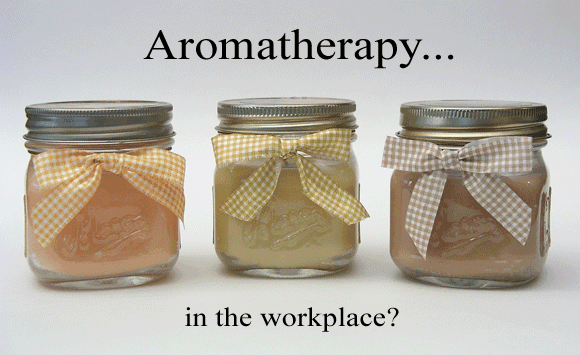


While it’s been long thought that colors can affect our mood and productivity, what about scents? Can filling a room with a specific scent help you focus or work more productively? I can understand that some of you might be skeptical. I was at first too, but office aromatherapy has been effective at helping me get through the work day for years.
I’ve always been a fan of aromatherapy, surrounding myself with candles, incense, and scented oils. I work at home, so I can alter the scents around me at any time without worrying about upsetting other employees. I knew two scents in particular had an effect on me–pine and pumpkin. I tended to be more alert when I burned pine candles (they would help me get through afternoon lulls for instance). Pumpkin was a scent that relaxed me, so I often burned those candles in the evening.
There was Something to This Scent Thing
I didn’t really think much about it. I just burned certain candles when I felt certain ways. But one day I came across a news article. It discussed a Japanese study on pine scent and productivity. In essence, the researchers evaluated the productivity of employees with and without pine scent being put through the office ventilation system, and they found that employees worked more productively with a light pine scent in the air.
It interested me to see my own casual experiences backed up by a study, so I started experimenting with other scents in my own work life as well as researching the effects commonly associated with various scents in aromatherapy.
At that point, I started making more conscious decisions about what scents to burn when I was working. I could barely get through the afternoon hours without a pine candle burning. Another scent that ultimately worked for me was cinnamon. I found that cinnamon incense helped me focus better on creative projects (even though it’s a scent I don’t typically enjoy).
The key was experimentation. While some scents have common associations, they may not affect everyone in the same way. Try a few yourself (if you’re able to), and see how your mood and productivity change. To help you get started, here are some scents and the effects they’re commonly believed to have in aromatherapy:
Pine – To increase alertness
Cinnamon – To improve focus
Lavender – To relax during a stressful work day
Peppermint – Another scent thought to perk you up
Citrus (any) – To wake you up (another scent when you need to be more alert)
These are some of the more readily available scents that would have a potentially positive effect in the workplace. You can certainly experiment with others to find out which make for the most appealing work environment for you.
Aromatherapy in the Workplace Without Offending Others
If you work in an office with other employees, you probably won’t be permitted to burn candles or incense. You also may upset coworkers if you’re releasing any kind of strong scent into the shared workspace (such as through scented oils). However, there are a few options you can try that won’t create an overpowering aroma, but which you still might find effective. Give these ideas a try:
Try to be sensitive to your employees or coworkers if you decide to experiment with scents in a populated workplace. A scent that affects you positively may annoy someone else, and there’s always a possibility that someone will have an allergy to a plant or specific oil. Always get your employer’s permission to use aromatherapy in the workplace. Otherwise you may need more than the right scent to improve your or your colleagues’ moods.